Are you managing your own team? Wondering how to advance past your team of individual contributors to leading a group of managers?
If you're reading this, chances are you've thought about the next big step in your leadership journey: becoming a senior leader.
There's a lot to learn to reach the senior level. But first, you need to get the job. Fortunately, the steps to get there are similar to the key things to become a manager.
And just like we previously helped you with how to become a manager, today's post helps you think about how to become a senior leader.
Table of Contents:
- How to become a senior leader: 5 tips to help you get promoted
- Next steps: Skills you should master as a senior leader
- Further reading to be a great future senior leader

How to Become a Senior Leader: 5 Tips to Help You Get Promoted
To show that you're a good fit for a senior leadership role, you need to demonstrate that you're a great manager. You also need to show that you're open and ready to learn and grow into something more.
Our tips for you below are a balance of these two elements:
- Being an amazing manager of individual contributors today
- Showing you have the potential to be a great senior leader in the future
Let's start with the first and most straightforward tip of all: consistently deliver.
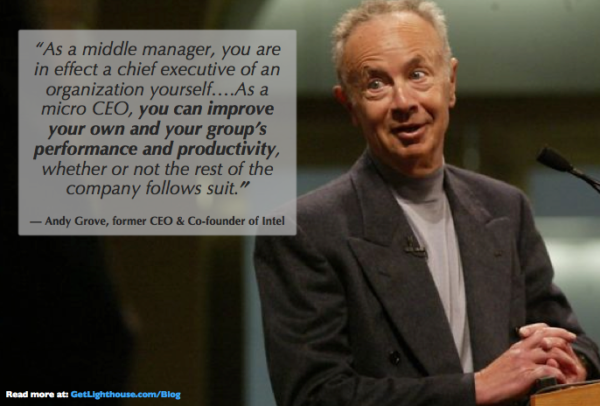
1) *Consistently* Deliver results
This should be no surprise, but it's worth emphasizing: you can have all the soft skills in the world, and your team can love you, but if you aren't delivering the results for your business and organization, then you're not a strong candidate to become a senior leader.
Whether it's making sure your team members crush their sales numbers, or you build a dependable team that can tackle any engineering problem, make sure you're delivering the results that are needed to help your manager, department, and company look good.
This, above all other things, shows that you're a leader. So make sure you have clearly defined goals and metrics that show your impact as a leader and that you and your team are succeeding.
Balance being hands on and hands off
Many managers make one of two mistakes, both of which can limit and frustrate their team members:
- You micromanage: Hovering over your teammates and treating them like they don't know how to do anything themselves can be very frustrating. If you dictate every little aspect, constantly checking up on them, even for things they're experienced in, you'll hold your team back and could even lose your best people.
- You step back and manage completely hands off: Being an absentee leader is also bad as your team has no support when they need it most. While sometimes your team would be relieved to be free to do their work, any time they take on something new, they will struggle without your help and guidance, leading to poor results.
*Learn more about How to Balance Accountability vs. Responsibility as a Leader here.
Knowing when to step in and manage more closely vs. stepping back and letting them handle the task is a matter of knowing their task relevant maturity (or TRM), a measure of how skilled they are at the current task.

Use task relevant maturity to drive results
Task relevant maturity, coined by legendary CEO and co-founder of Intel Andy Grove, is a helpful guide as you take steps to identify how to grow your team and improve performance.
One month, a member of your marketing team might be doing something they have lots of experience in, like helping design ads. Another, they might be managing ad spend and optimization, something they've barely done before.
If they've handled everything fine thus far, don't assume when they shift to that new responsibility that they're going to perform the same. If they don't have experience managing ads and you give them the same freedom as you did while they were designing, their chance of failure is high.
That will have an obvious effect on the team's results but it will also discourage them and hinder their growth, further affecting performance.
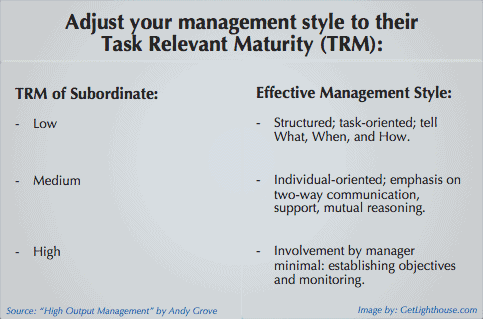
Instead, reflect on their experience and skill for each major task they have and be more supportive when they need it. Then, when they do work you trust them with, you can be more hands off as the table above guides you through.
Task Relevant Maturity applies to you, too.
You can also apply TRM to yourself. As a manager, you should be working to regularly improve your skills, while recognizing weaknesses you have to work on.
By reflecting on your own strengths and weaknesses, and working to improve where you need to, you demonstrate to your team the importance of self-improvement.
You also show your manager that you can handle adversity and can ask for help when you really need it. The higher you rise in an organization, the more important this becomes, as busy executives will expect you to come to them, not need them to probe you for issues.
As you look to advance in your career, deeply understanding Task relevant maturity is a key concept for helping you manage the growth and ongoing success for both you and your team.
By keeping a watchful eye on any potential weaknesses and helping coach your people through challenges, you can ensure you deliver the results deserving of a senior leadership role.
Further reading:
If you're ready to become a senior leader, you should also know how to help your team succeed in general:
- A key skill to understand is that you should focus on your best people becoming even greater and amplifying those around them, which is covered in our post: Lessons from Gallup's Marcus Buckingham in "First, Break all the Rules"
- The more you are promoted, the more likely you are to inherit struggling team members, or have a less than stellar contributor you need to get the best from. Make that no big deal by learning how to motivate underperforming employees.
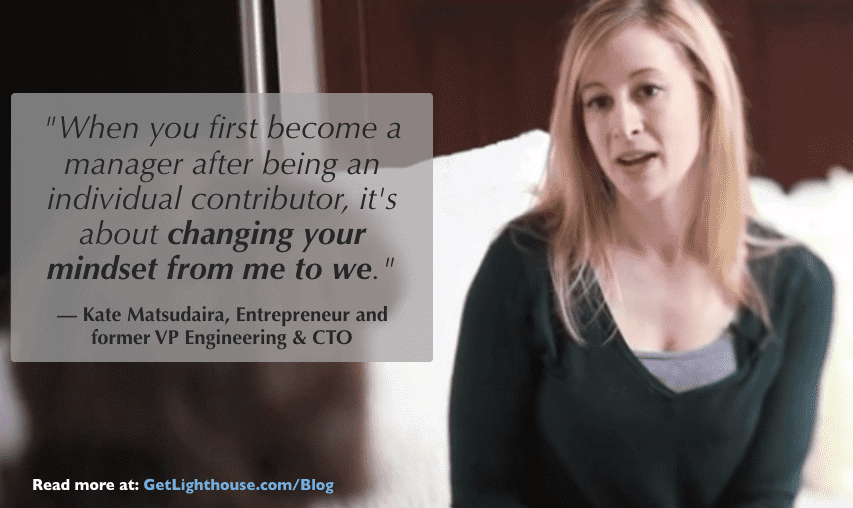
2) Be a great manager of individual contributors.
Being a front line manager is your foundation.
If you can't manage your team today, then how could you possibly add layers of management below you?
This is how you end up being another case of the Peter Principle, which states:
"In an organizational hierarchy, every employee will rise or get promoted to his or her level of incompetence.”
Typically, the Peter Principle happens when you get promoted to a new role when you are doing something totally different than your last job, or you weren't already great at the last role.
For managers, this is especially dangerous, because the higher ranking the person who does a poor job, the more people it affects.
Gallup calls this the Cascade Effect:
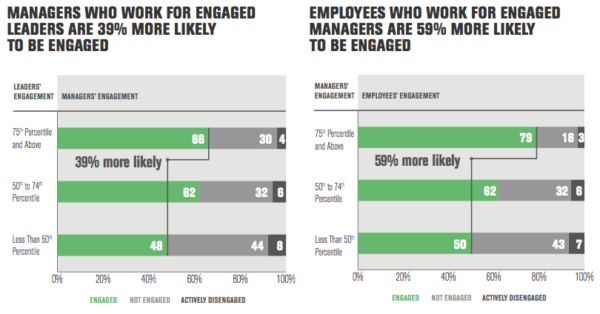
As you can see, if the manager is engaged, it's much more likely that their team is as well. Meanwhile, if you're struggling, your team will know it, and it's hard to then bring out the best in them.
A senior leader has to show other managers how to be effective. That means you need confidence in your skills, and no glaring weaknesses in your management toolkit.
Would you want to learn how to be a plumber from someone who regularly burst pipes and solves most problems with duct tape? You would not, so make sure you know how to lead effectively as a manager, before you push to move into a senior leadership role.

Become a great manager to position yourself to become a great manager of managers
Mastering the fundamentals is essential to your long term success. As a manager, that means doing everything needed to make your team succeed.
To tell if you're ready, ask yourself if you are a great manager of individual contributors today. Reflect on a few key questions:
- Have you had any voluntary turnover in the last 6 months?
- If so, fix issues related to why that happened first. It only gets harder with more layers and bigger teams.
- If so, fix issues related to why that happened first. It only gets harder with more layers and bigger teams.
- Can I trust my team to come to me with problems or do they hide them?
- Especially as you rise, you need trusted employees that will tell you about problems, regardless of your seniority or title. Otherwise, you'll end up in a never-ending fire fighting mode.
- Do you know which of your employees are interested in management?
- Having a talent pipeline is important, so you can fill openings behind you as your group or department grows. Not everyone wants that role, and as you likely know, there's a lot to learn. The sooner you start those discussions, the better off you'll be long term.
- Having a talent pipeline is important, so you can fill openings behind you as your group or department grows. Not everyone wants that role, and as you likely know, there's a lot to learn. The sooner you start those discussions, the better off you'll be long term.
- Have you mastered the art of hiring? Are you onboarding talent well?
- Few things are as costly as a bad hire. Meanwhile, every day someone isn't up to speed and productive is a waste of your budget. Improving your success rate at hiring and getting people started fast will make you stand out and help your team thrive.
If you're a senior leader, any issues as an IC manager are compounded. That's why it's so important you build your foundation on solid ground. Any weaknesses you have as a manager of ICs, now is the time to address them, not after you get your next promotion.
Further reading:
Work on mastering the fundamentals of great management with these posts and advice:
- Become a master at building rapport, so your team trusts you and has psychological safety.
- Help your employees grow, so your best employees stick around long term, and everyone feels challenged at work.
- Have amazing, impactful, positive 1 on 1s to fix problems, listen and learn from your team, and a lot more: One to One Meeting Template

3) Be at a company where your department is growing
If your company isn't growing, you're unlikely to have a chance of becoming a senior leader. Otherwise, it won't make sense for them to promote you unless you know your boss is leaving and you can then get their job.
To find out if a promotion to senior leadership is possible, start by asking your boss or an executive about growth plans for the coming year or two.
If your specific team isn't going to grow, but another similar role that you could do is, then you may want to see if you can make a lateral move to set yourself up better going forward.

Find out if your company promotes from within
It's important to know if your company has a history of promoting from within or not.
Even if they have plans to grow, if they plan on hiring outside to fill those rolls (especially if they have a history of doing so, regardless of what they tell you), you'll want to know as that should influence your decision to stay or not.
You can also consider trying to sell, or suggest, the value of promoting from within, but culture change like that can be a tough sell.
If you're looking to make that case, check out our guide: benefits of promoting from within.
And of course you want to be successful if they do promote you, so you can also look to avoid these common reasons companies fail when they do promote from within here: The Top 10 Reasons Companies Fail at Promoting from Within.

What if my company isn't growing?
If your company isn't growing and you really want to be a senior leader, you may need to consider a lateral career move to a company that is growing. The good news is, if you do that, then you can make a discussion about your desire for growth and advancement part of the interview process.
Make sure that the company has a culture of promoting from within, and sees an opportunity for you to grow based on how the area you're interviewing for expects to expand in the coming months and years.
Make the best decision for you and your family, and keep in mind, you could build the foundation in your current role that makes you easy to promote when we're fully recovered from the pandemic.
Further reading:
- Consider these points before deciding whether to leave or not: When to Quit Your Job, If You're a Leader (and how to do it well)
- Read this to learn about how you can manage your own career growth: How Employees Can Drive Their Own Career Growth
- If you do decide to interview, ask these questions to make sure you like your new manager you report to (and who would heavily influence your ability to be promoted there).

4) Master Managing Up
Managing up is always a challenge, and it only gets harder as you rise in your organization. This applies to your boss, too.
And guess who has a huge say in whether you get promoted? Your boss.
If they're leaving, they're likely to make a recommendation for their successor, and at the least will be mentioning to your future boss how good or bad you are.
If they're staying and getting promoted too, then they'll definitely have a lot of say in how their department evolves… including promoting managers to senior management.
That's where the power of managing up comes into play for you.
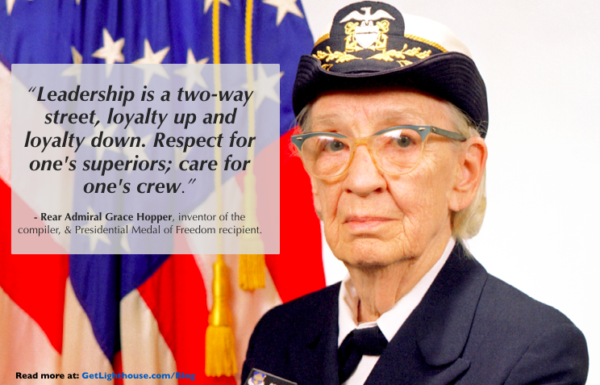
Manage up to position yourself as the ideal candidate for promotion
As much as you might want to think that you could be identified and promoted purely from your performance alone, the truth is, there's no guarantee of that.
By showing your manager you know how to manage up and make their life easier and better, they're more likely to trust you with more responsibility.
Here are some tips for mastering the art of managing up:
- Mirror their preferred communication style: Take the time to learn how your boss prefers to communicate and receive information from you. As we learned from veteran leader and author, Mark C Crowley, a good leader appreciates being made aware of potentially big problems, and wants to work with their team to find good solutions. How that is best done will vary leader to leader, so ask them!
- Walk in their shoes: Leadership coach Beth Armknecht Miller suggests learning what your manager's goals and priorities are so you can help them achieve those goals. Also, learn to anticipate their needs and understand them better as this will allow you to build their confidence in you. You want to develop empathy for your team, and should do the same for your manager.
- Ask the right questions: Take a page from Forter VP of Engineering Oren Ellenbogen's book by asking yourself questions like, "Who's doing brilliant work? Are they aware of it?” and "Who's struggling? What are you doing to help them?” Then bring this information to your manager to give them the clarity necessary to know how they can help you. This improves your relationship with them, can boost your performance, and makes absolutely sure they notice your efforts.
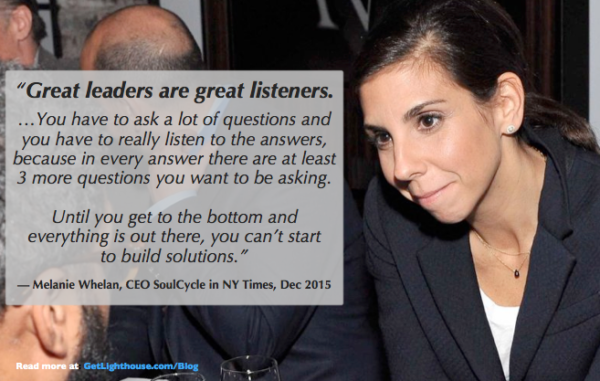
Ask the right questions
Just like we've taught you the importance of asking good questions of your team to help, support, and lead them better, you'll also want to ask your manager questions.
Communication is a big part of effectively managing up with your boss. The right questions, in particular, can help you uncover key insights that allow you to improve your relationship with your manager and learn what you can do to help make their job easier.
For example, you can ask this question to better understand their goals and priorities:
- Here are my top X priorities. Do these align with your priorities?
Or this question to help anticipate your boss's needs:
- I noticed problem X and was thinking Solution Y could help. What do you think of that?
No matter what you're trying to do, there's a question you can ask to help you manage up more effectively. Read our guide on 18 Questions to Ask Your Manager to Better Manage Up to learn more great questions to master managing up.
Further reading:
- Learn 9 Expert Tips for Managing Up at Work from Real Leaders
- How to Develop More Empathy for Your Manager to Better Manage Up and Get What You Want

5) Have a plan and be clear about your goals
Never assume your manager can read your mind. If you want to advance, start a dialogue with them in your 1 on 1s. Be proactive about asking things like:
- What do you think are the most important skills needed to succeed in a role like yours?
- What weaknesses do you feel I need to work on to be ready to advance?
- How does being a manager of ICs differ from managing managers?
- How do you see our organization growing in the next year or two?
- What opportunities for advancement do you see for me at this company?
You may not always like the answers you hear, but these questions can help you better understand your chances of advancing at your current company.
Even if it's bad news, and you find out there is no growth path, your manager thinks you're too important in your current role, or that your manager thinks you are nowhere near ready, you can now act on that information.
While that could be a tough pill to swallow, it can save you from wasting years of your life hoping for a promotion that never comes.
On the positive side, it will often also paint a clear picture of what you need to work on. That could include:
- Showing more of your work to your manager, so they see your key wins and effort
- Learning how to improve in the areas your manager believes are your weaknesses
- Improving how you communicate about issues affecting your team
If you trust your manager, understand that "not yet” doesn't mean "never.” Take their feedback to heart and use it to become a better manager - one that is worthy of being promoted to senior manager.
Be clear about where you want to go in your career
Equally important, you need appreciate the commitment you're making by stepping into a senior leadership position at the company you're at. The more you advance in your career, the harder it is for you to quit.
As you get promoted, and take on more senior roles, the stakes rise as well; not only will you face more pressure and scrutiny, but deciding it's not for you is harder. Quitting as a senior leader is a much more complex change both for you and the company you're leaving.
Common organizational problems that can come with quitting in a senior leadership role include:
- Your team could feel betrayed if you leave
- Your team could leave with you, creating a giant hole in the company, and violating non-compete or non-solicit agreements
- You could be breaking a promise you made to the leader that hired you
- Your departure could hurt the company with customers and/or investors
- And perhaps worst of all for you, you could be sending the wrong message to future employers that you can't fix problems, or aren't senior leadership material
Some of these potential issues might not seem fair, but they're part of the reality of taking on a high-level leadership role in any organization.
The more responsibility, the greater the potential benefits and payoffs for you, but also the greater potential damage to you, your team, and the organization, if things don't work out.
Make sure you're clear on whether this is where you want to go in your career before making the jump to pursuing a senior leadership role.
Also, think long and hard about if the company you're at is one you want to commit to long term. If you're not loving it, you can end up feeling trapped or not set up for success.
Fortunately, if you're at a great company, this can be one of your greatest motivators; if you put in the work to become a great senior leader, you'll become a very important contributor to the success of a company you love.
Further reading:
- If you realize it's time to go, learn how to do that well with: When to Quit Your Job, If You're a Leader (and how to do it well)
- Take control of your career growth if you decide to stay (and teach your team to do the same): How employees can drive their own career growth

Next steps: Skills You should Master to be a Great Senior Leader
Now that you've begun work to position yourself for a promotion to senior leader, the next step is to start developing the key skills necessary to be a great manager of managers.
While there are some things you can only learn once you've taken your new role, much of what it means to be a senior leader you can start practicing now.
The challenge with going from being a front line manager to a manager of managers is that you'll now need to teach what you know about managing to others.
As any teacher will tell you, knowing how to do something sufficiently well, and teaching others how to do it, are two very different things.
It's useful to start thinking, "How will I make my future managers successful?”
This starts with the foundation we discussed earlier; knowing what it takes to be a great front line manager, and recognizing how you've done those well (or are learning them yourself) is a great start.
To give yourself more ideas, and a handy reference to share with any new manager, you can read our guide on 7 Tips for First-Time Managers: How to Win as a New Manager.

Learn the skills every senior leader should master
You'll also need to learn what skills and practices are vital to being a great senior leader in general. For example, all of these are critical to growing and developing other managers, but you may not be focused on today:
- Checking in on how employees deep in your group or department are doing by having skip level 1 on 1s
- Creating a great culture for your organization by thinking intentionally about instilling values and leading by example
- Knowing how to develop leaders, not just promoting people with potential
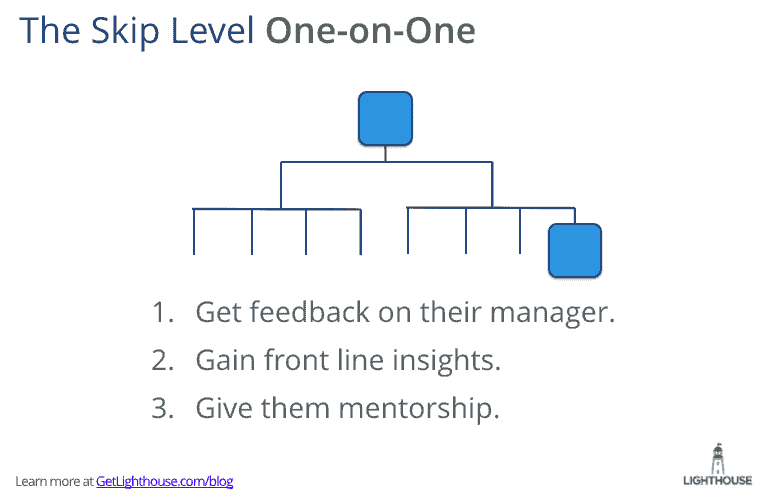
And that's just scratching the surface. There's also understanding task relevant maturity, mastering buy-in, as well as obtaining feedback from your managers, among other things.
To learn more about the key skills that every senior leader must master and help move your leadership career forward successfully, read our master guide on 15 Skills Senior Leaders Must Master.
And don't forget to check out our other guides to help you develop your senior leadership skills...
Further reading for your journey to becoming a senior leader:
- Developing Leaders: What To Do When Your Team Grows Too Big
- How to Use Skip Level 1 on 1s to Majorly Improve Your Managers as a Senior Leader
- Task Relevant Maturity: A Management Concept Great Leaders use Daily
- How Managers Can Get More Feedback from Their Teams
- How to Get Team Buy in for an Important Change You Want to Make
- Culture Change: How to Improve the Culture of your Team
Checklist: Are You Ready to Become a Senior Leader?
Transitioning to a senior leadership role is a big step. Before pursuing a promotion, consider how many of the core competencies you have that are required for a senior level role.
You can use this checklist to evaluate your readiness::
Strategic Thinking
- You understand your company's overall objectives and how your department contributes.
- You can look ahead to anticipate and plan for challenges and opportunities that may come a few quarters or more into the future.
- You are able to offer quality ideas to improve your team’s and company’s performance from opportunity and problem identification to execution of plans.
Cross-Functional Influence
- You have and know how to build strong, collaborative relationships with your peers.
- You have a good understanding of other departments in your company and know when to involve them and what they should be updated on..
- You can resolve cross-department conflicts and issues.
Developing Teams
- You know how to develop individual contributors, and can teach others how to do the same.
- You are comfortable and capable of mentoring and coaching managers to help them level up their skills, too.
- You have experience in building teams through quality hiring and onboarding of new employees.
If you cannot confidently check most of these boxes, you likely need more time to improve yourself before getting that senior leader role (or you will have some very important on the job learning to do!).
You can start building these skills right now.
If you want to work on any of these areas, there’s a lot you can do in your current role. Look for opportunities like:
- Taking on stretch assignments and special projects that let you demonstrate strategic thinking or cross-functional leadership.
- Joining training programs focused on management and leadership development to round out your skills..
- Seeking out a mentor who can coach you in the areas you’re struggling.
- Using your performance review to work with your manager to identify mutually agreed upon areas of weakness to improve, so they become an advocate for you.
Remember: Be patient. While you may have advanced rapidly early in your career, rising further in the ranks often takes longer each step you climb.
Focus on building these skills and keep your eye out for new opportunities. The more you demonstrate competence and stack wins in your current role, the more likely your company will recognize you’re ready to become a senior leader.
And if they don’t have the opportunity, all of this effort creates new resume bullets and talking points that can help you find the senior leader job somewhere else.
Want to build up your management skills? Lighthouse Lessons can help you.
Our bite size, highly actionable programs are perfect for even the busiest of managers. Become a better leader like Jonathan Silva did by learning more and signing up here.

What is a senior leader?
A senior leader is a manager who has direct reports that include other managers. This means their organization has multiple layers in it. These leaders may also be executives, especially if the company is small, but they can also include middle managers in large organizations like VPs and Directors.
What is a senior leader's role?
A senior leader's role is to help set strategy, make long term plans, and help ensure their organization is successful. A key part beyond planning and meetings, is to ensure their teams are growing and the managers reporting to them are doing a good job. Learn what it takes in our post.
What makes a great senior leader?
A great senior leader must master many skills including:
- Skip Level 1 on 1s
- Asking good questions (and listening!)
- Organizational communication
- Promoting the right people
- Retaining good employees
- Teaching & helping new managers by successful
- Balancing when to be hands on and hands off
- Onboarding employees quickly and effectively
And 7 more found in the post here on 15 skills senior leaders must master




